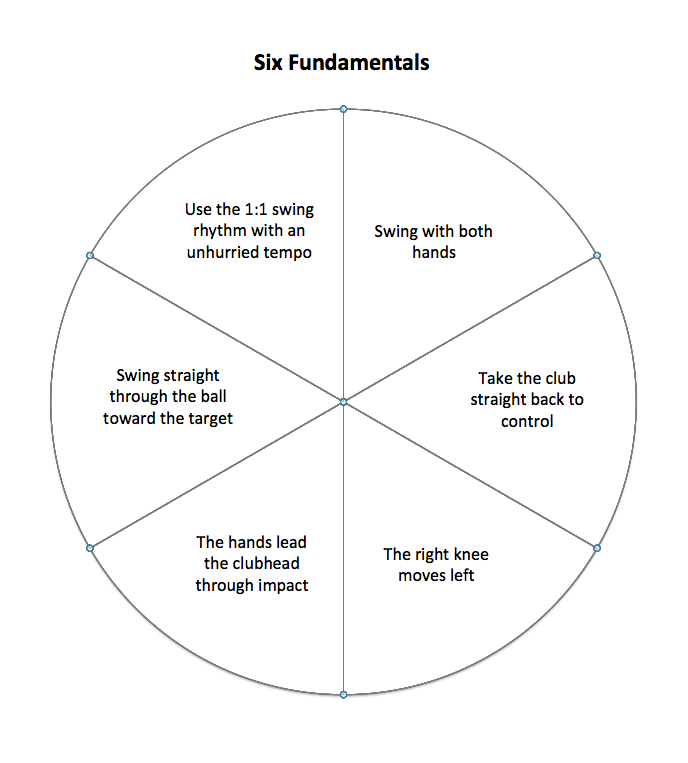In 2014, I published a multi-media essay titled Six Fundamentals of the Recreational Golf Swing. Ten years later (where does the time go?) I still refer to them to make sure they are still present.
But you know that the golf swing doesn’t boil itself down to just six things. There’s a lot more to it than that. The problem is, you can take on only so much at one time. Even six is a lot.
So you, or I, don’t have to hold all those things in our head, lest we forget what it is we’re forgetting, I made a pie chart showing what they are, in a rough sequence, going clockwise. I used to take a print of it to the range to remind myself of what I was there to work on.
Here it is:

I’m now working of a new list of six things. There is some overlap with the old list, to be sure. The new list contains things I know are correct but I forget to do because of old habits.
This is my new list:

Forearms together – You want to have a feeling of connection between your forearms at address, and maintain that feeling throughout the swing. Ben Hogan and Mickey Wright said this was one of the most important aspects of their swing technique, and they are right.
Clubface square at the top – This is accomplished by keeping rotation completely out of your forearms. You have to train your hands to feel this, because that is where the rotation, if any, will be felt, especially in your right hand (left hand for port-siders). Remember, your hands are where you sense rotation. They are not what prevent rotation.
Complete the backswing – Don’t make your backswing too short. Let it come to a comfortable, relaxed ending. Feel like the club comes to a natural stop that suggests a rhythmic response to initiate the forward swing.
The hip turn starts the forward swing – And that response is for the hips to turn. The arms do not swing forward until the momentum of the hip turn impels them to.
Do not rush the start of the forward swing – Critical, critical, critical. Do not whip your hips around, do not throw your arms into the ball. Let them flow sequentially in a graceful way.
Use a tempo that allows everything to happen on time – If you move faster than you can manage, your technique will get into playing catch-up, and movements will always be late. If your swing is too slow… Ever seen a swing that was too slow? Neither have I. Never mind that one.
Now so you can make you own chart to remember the swing bits you are working on, download this Excel file. Then:
1. Overwrite the descriptions you see with a brief description of each bit you are working on. The text is in text boxes. Try not to move them around. Express your bit in ten words or less. Five words would be better.
2. When you’re looking at the chart, the lines making the circle and wedges might not show up very clearly, if at all. They’re there. Click once inside the pie chart (but not in a text box), and the lines should appear.
3. Make a screenshot of the frame and chart. This is easy to do on my Mac.* Press Command+Shift+4. A little cross and circle will appear on the screen. Move it with your mouse to the upper left of the frame. Now left click and drag the thinger to the lower right of the frame and release the mouse. A screen shot will be taken and put on your desktop. If you have a PC, taking a screenshot is more complicated, so look up how to do it on the web.
4. Now you can print the screenshot and take it with you to the range. Or when you make practice swings in your house.
In conclusion: Just as you cannot boil the golf swing down into six principles, neither can you boil it down to twelve. I do, however, recommend you consider installing my new list into your swing if you haven’t already done so.
And yet, they might not be the principles you need to turn your swing into what you want it to be. They are what make MY swing work. You have to discover your own.
*I know what you’re thinking. I have Microsoft Office for Mac installed on my iMac.



